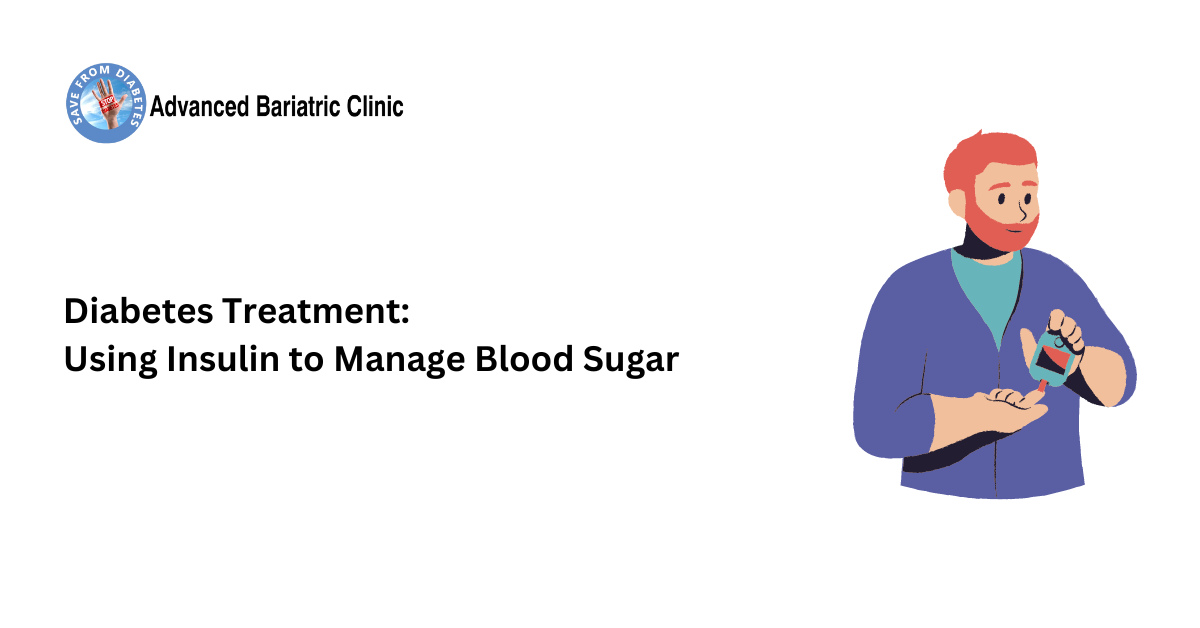Insulin Therapy for Type 2 Diabetes

Diabetes is a chronic medical condition where insulin production is not sufficient for the body, leading to various complications like heart problems, kidney damage and nerve issues. Diabetic patients experience symptoms like frequent urination, excessive thirst and blurred vision. Insulin therapy helps ease such symptoms and improves well-being of such individuals. When other treatments fail to control blood sugar levels, insulin therapy is the life savior. Learn with Advanced Bariatric Clinic about insulin therapy for type 2 diabetes and how flexibly it helps in managing diabetes.
Insulin needs vary from person to person. There are different types of insulin available in the market depending on characteristics like concentration, route of delivery, peak, etc. Your doctor will prescribe you insulin depending on your body’s requirements.
Learn About Types of Insulin
Rapid-acting insulin
This insulin takes the least time to reach your bloodstream to lower your blood sugar levels. Taken right before a meal, you can experience the magic of this insulin within a few minutes. The effect lasts between two to four hours.
Long-acting insulin
This type of insulin takes a long time to be absorbed. Patients should inject this only once a day as it lasts for most of the day. The stability of this insulin is very high.
Short-acting insulin
This insulin must be injected at least half an hour before your meal. It takes 30 minutes to start working effectively and lasts upto six to eight hours.
Read More : Diabetes Treatment: Using Insulin to Manage Blood Sugar
Intermediate-acting insulin
The longer it takes to work, the longer it stays. This type takes longer than the short-acting insulin to show effects, but it stays in the body for upto twelve hours.
Things to Remember about Insulin Therapy
- Overdose of any substance potentially leads to complications. Excessive intake of insulin can lead to decreased blood sugar levels or hypoglycemia. Symptoms of hypoglycemia include dizziness, sweating, pale skin, confusion, tiredness and trouble speaking.
- Never alter or dilute your insulin with other substances, as it can lead to serious consequences.
- Do not use expired insulin under any circumstances.
- Change your injection site from time to time to prevent lumpy skin.
- Listen to your doctor and avoid self-analysis.
- Maintain a healthy lifestyle to improve your health.
Advanced Bariatric Clinic offers various plans promoting a healthy diet and lifestyle. Check out our services to lead a healthy life with your loved ones.
Recent Posts
-
 Caring for Young Warriors: Managing Diabetes in Children and Adolescents in Hyderabad
Caring for Young Warriors: Managing Diabetes in Children and Adolescents in Hyderabad -
 Demystifying Diabetes in Hyderabad: Prevalence, Causes, and Preventive Measures
Demystifying Diabetes in Hyderabad: Prevalence, Causes, and Preventive Measures -
 Balancing Tradition and Health: Traditional Hyderabadi Foods for Diabetes Managemen
Balancing Tradition and Health: Traditional Hyderabadi Foods for Diabetes Managemen -
 Navigating Diabetes in Hyderabad's Climate: Tips for Effective Management
Navigating Diabetes in Hyderabad's Climate: Tips for Effective Management -
 Why Advanced Bariatric Clinic is the Best Diabetologist in Hyderabad
Why Advanced Bariatric Clinic is the Best Diabetologist in Hyderabad











